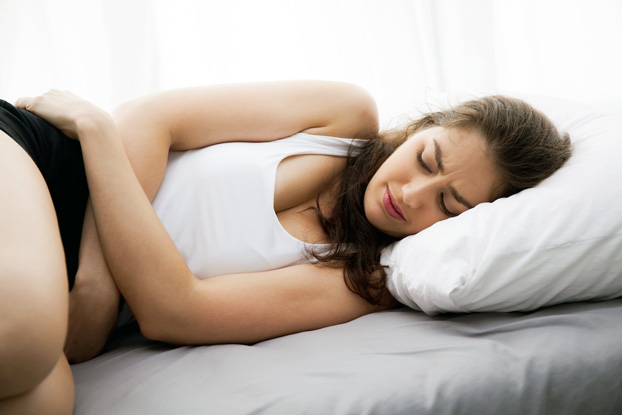Menstruation is the monthly bleeding that happens when, in the absence of a pregnancy, the lining of the uterus is shed and passed through the cervix. This bleeding is commonly referred to as a period, but menstruation is only one phase in an important monthly hormone cycle that regulates the female body and it can be a marker of a person’s overall health.
Essential Hormones
 As a girl goes through puberty, the pituitary gland in her brain starts to release the hormones estrogen and progesterone which matures her reproductive system. Once all of her reproductive organs are developed and are working together, menstruation begins and she is able to get pregnant. Menstruation can start at any time between eight and 15 years old, with the average age for American girls being 12.
As a girl goes through puberty, the pituitary gland in her brain starts to release the hormones estrogen and progesterone which matures her reproductive system. Once all of her reproductive organs are developed and are working together, menstruation begins and she is able to get pregnant. Menstruation can start at any time between eight and 15 years old, with the average age for American girls being 12.
The hormones that commence menstruation in puberty are also responsible for many other essential biological functions beyond regulating the reproductive cycle. Hormones help stimulate cell and tissue growth, promote brain function, control mood, and stimulate sleep. These elevated levels of hormone production will continue until she reaches menopause, usually between the ages of 45 and 55. In menopause, the hormones progesterone and estrogen decrease, periods cease, and women are no longer able to become pregnant.
Your Monthly Cycle
Each month, a woman produces hormones that regulate her body function. The first day of her period marks day one of the cycle and goes until the first day of the next period. An average cycle last 28 days, although it may be longer or shorter for different women at different points in their lives.
In the first half of the cycle, estrogen levels rise which cause the ovaries to begin maturing an egg cell and the lining of the uterus thickens in preparation to support a fertilized embryo. Approximately two weeks into the cycle the ovary releases an egg (ovulation) and it travels down the fallopian tube and into the uterus. If the egg is fertilized by sperm and implants into the nutrient rich lining of the uterus, a pregnancy will occur and the period will be missed. However, if a pregnancy does not take place hormone levels drop and the lining of the uterus is shed in the form of a period. Bleeding can last between two to seven days, although three to five days is the norm. When a given cycle is complete it will begin again the next month.
Periods can vary in frequency and quality from month to month and they are prone to change over time. Younger women’s cycles and days of menstruation often last longer and as they age their cycles usually become more regular and bleeding may be lighter.
Symptoms and Side Effects of Menstruation
Right before a woman gets her period each month she may experience a variety of different symptoms that are broadly referred to as PMS or Premenstrual Syndrome. Symptoms associated with menstruation are most often caused by chemicals in the brain and the levels of hormones rising and falling which cause the uterine muscles to contract (cramps) and other symptoms like headache or leg pain.

Common PMS symptoms include:
- Abdominal or pelvic cramping
- Backache and/or leg pain
- Bloating
- Acne
- Loose stool/diarrhea
- Tender breasts
- Food cravings
- Mood swings including irritability, depression and anxiety
- Headache and fatigue
In most cases, PMS symptoms subside a day or two after the period begins and can be mitigated by lifestyle changes. Regular, moderate exercise, proper hydration, and a healthy diet low in salty or high-sugar foods can help decrease symptoms.
Medications can also help ease cramps and headache or back pain. Medications like Ibuprofen (Motrin®, Aleve®, Advil®, Midol®) or aspirin are effective, but a doctor may prescribe prescription medications to alleviate especially severe PMS symptoms. If a woman is suffering extreme pain or mood swings related to her period, she should discuss treatment options with her health care provider. Some medications, including certain types of birth control, can help manage severe PMS side effects.
Menstruation: A Sign of Good Feminine Health
The monthly cycle of hormones a woman experiences during her period is essential to her overall health. Sometimes abnormal menstruation can indicate a significant health condition.
Women should see a doctor if:
- Severe pain and cramping that last days or weeks
- Irregular periods, especially if the irregularity is new
- Periods occur more often than every 21 days or less than every 35 days
- Periods stop for 90 days or more in the absence of pregnancy or breastfeeding
- Bleeding lasts for more than seven days or becomes heavier than usual; if bleeding is severe (soaking more than one pad every one to two hours)
- Vaginal bleeding occurs between periods
- A girl who is older than 15 has not started menstruation
Demystifying the Menstrual Cycle
It is helpful for women to know what their bodies go through each month and how their menstrual cycles are connected to their general health. When women understand their monthly cycles, they are better able to cope with their side effects and be attuned to signs they may be sending regarding other health issues.
If you are concerned about abnormal or especially difficult menstruation periods and PMS contact Kansas City ObGyn today at This email address is being protected from spambots. You need JavaScript enabled to view it. or 913-948-9636 to discuss your options.






